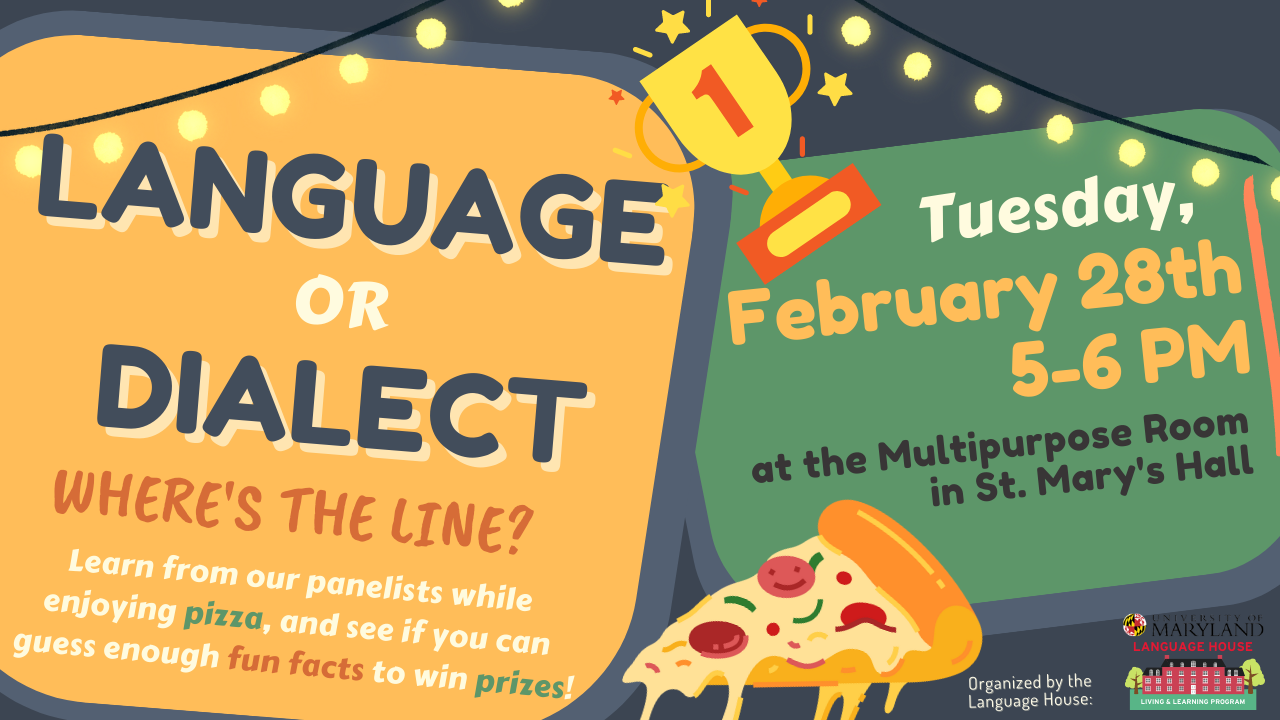Language or Dialect

Language or Dialect
What makes a linguistic code a language or a dialect? Weinrich said that a “language is a dialect with an army and navy”, so, where do we draw the line? This Language House event brings together graduate students in language and culture who come from areas where they speak what some consider a language and some consider a dialect. Join us to get their first-hand account on the issue!
Eat some pizza while engaging in an interactive panel to learn more about the distinctions between language and dialect, how it affects its speakers, how it relates to culture, and participate in our trivia to win prizes!
The panel will feature students representing different: Abruzzese (Italian), Arabic, Catalan (Spanish), Chinese, Creole (French), Japanese, and Swiss (German). You can read more about our panelists below!
Clara Cuonzo - Abruzzese
3rd year PhD student in Linguistics
I grew up in Abruzzo, a central region in Italy. My native language is the variety of Italian spoken in my region which is deeply influenced by my heritage language, Abruzzese. Abruzzese originated from Latin independently of Italian, so it’s a sister language to Italian and one of the thousands of Romance languages. In the last 50 years, the amount of people speaking local languages has plummeted because of school education, news and television in “Standard” Italian.
Donia Galarowicz - Arabic
2nd year MA student in the Graduate Studies in Interpreting and Translation
My name is Donia, and I'm in my last semester of the GSIT program at UMD pursuing an MPS in Arabic to English Translation in the Localization and Translation Project Management track. I was born in Washington D.C. and I speak English, Arabic, and Spanish.
Sanshiroh Ogawa - Japanese
2nd year PhD student in Second Language Acquisition
I was born and raised in Ibaraki, Japan. Having a father from Hokkaido (northern part of Japan) and a mother from Kagawa (southern part of Japan), who speak two different varieties of Japanese, I grew up speaking Standard Japanese at home. I do, however, have some experience with Sanuki dialect, which is a dialect spoken in Kagawa, where my mother is from, as well as Ibaraki dialect, the dialect spoken in the region where I grew up. Although my experience with Japanese dialects is extremely limited, I hope to be able to share and discuss my thoughts surrounding dialects in Japan.
Michaëlle Vilmont - Haitian Creole
2nd year M.A. student in French
I grew up in Haiti where there is a weird form of diglossia between French and Creole. I remember going to school and having to learn the curriculum in French, whilst as a whole the population spoke (speak) Creole on a daily basis for all of their activities. French remains the second official language of Haiti as well as our administrative language, yet, Creole who is often mistaken for a dialect is also more than that, it our way of speaking, it is our way of being, and to some extinct we can say that the Creole language is the reason behind our independence!
Mireia Toda Cosi - Catalan
4th year Ph.D. student in Second Language Acquisition
I grew up in a Catalan masia (farm) in the countryside south of Barcelona. Even though I was raised in Catalan, most inhabitants learn both Catalan and Spanish, although some contest whether they are different languages despite an abundance of historical evidence to the contrary.
Micheline Wilson - Swiss German
3rd year PhD student in Second Language Acquisition
I grew up Basel, which is in the German-speaking part of Switzerland. I consider Swiss German (specifically, the Basel dialect or Baseldütsch) as my native language, but I also grew up speaking German, mainly in school.
Zhiyi Wu - Chinese
3rd year PhD student in Second Language Acquisition
I was born and spent the first 10 years of my life in Yichang City, which is located in the center of China where Southwestern Mandarin is spoken. I later moved to Nanjing City as a young teen, being exposed to lower Yangtze Mandarin, after which I moved again to Xi’an City during my first year of high school where I started hearing Central Plains Mandarin. Over the 18 years around the country, I have been exposed to many varieties of Mandarin and unfortunately, I have not become super fluent in most of these, mostly because the Beijing-based “standard Chinese” is the only language taught in classes.

